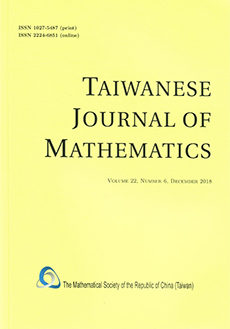Abstract
Let $p$ be an odd prime and let $m\not\equiv 0\pmod p$ be a rational p-adic integer. In this paper we reveal the connection between quartic residues and the sum $\sum_{k=0}^{[p/4]}\binom{4k}{2k}\frac 1{m^k}$, where $[x]$ is the greatest integer not exceeding $x$. Let $q$ be a prime of the form $4k+1$ and so $q=a^2+b^2$ with $a,b\in\Bbb Z$. When $p\nmid ab(a^2-b^2)q$, we show that for $r=0,1,2,3$, $$ \begin{array}{ll} & \displaystyle p^{\frac{q-1}4} \equiv \Big(\frac ab\Big)^r\pmod q\\ & \displaystyle\Leftrightarrow \sum_{k=0}^{[p/4]}\binom{4k}{2k}\Big(\frac{a^2}{16q}\Big)^k\equiv(-1)^{\frac{p^2-1}8a+\frac{p-1}2\cdot \frac{q-1}4}\Big(\frac pq\Big) \Big(\frac ab\Big)^r\pmod p, \end{array} $$ where $(\frac pq)$ is the Legendre symbol. We also establish congruences for $\sum_{k=0}^{[p/4]}\binom{4k}{2k}\frac 1{m^k}\pmod p$ in the cases $m=17,18,20,32,52,80,272$.
Citation
Zhi-Hong Sun. "QUARTIC RESIDUES AND SUMS INVOLVING $\binom{4k}{2k}$." Taiwanese J. Math. 19 (3) 803 - 818, 2015. https://doi.org/10.11650/tjm.19.2015.4132
Information





